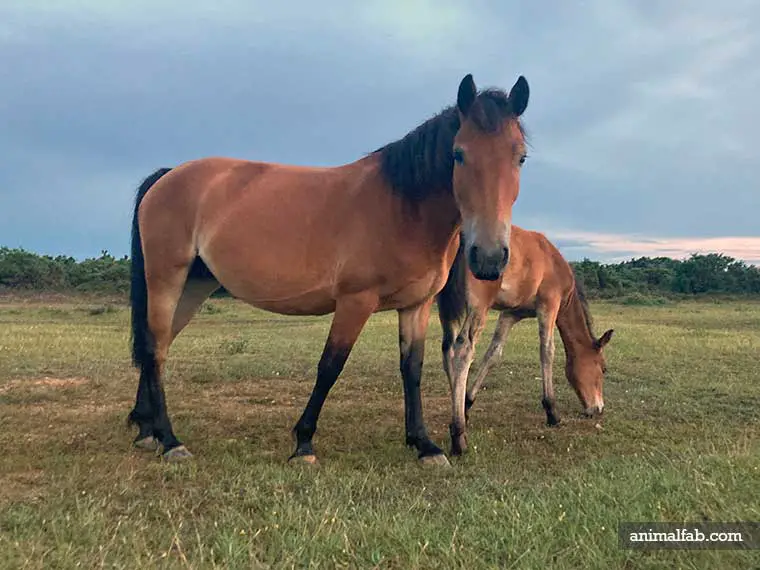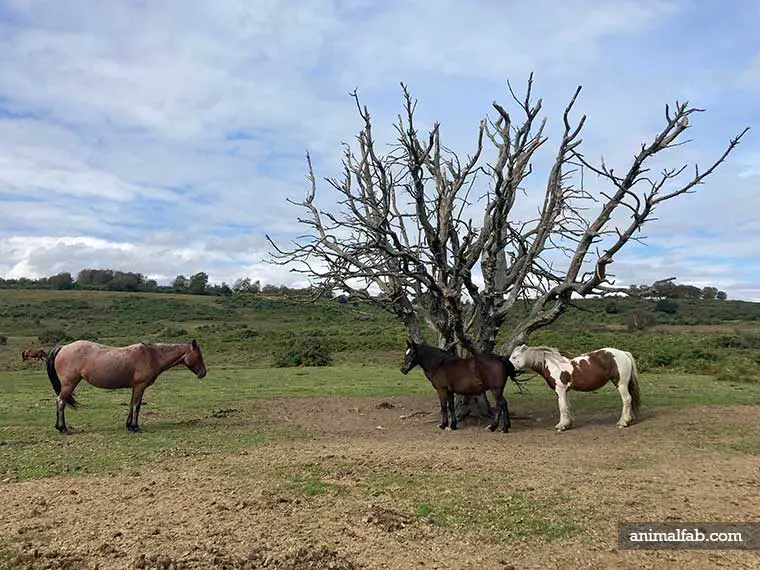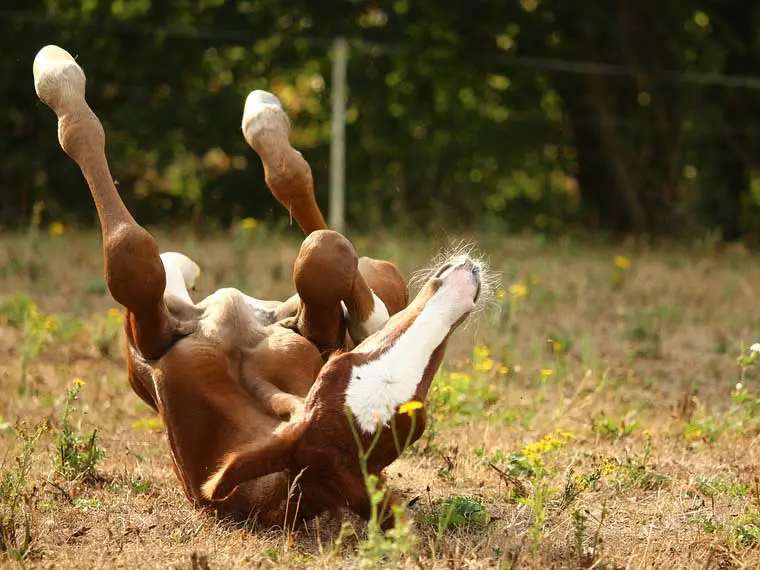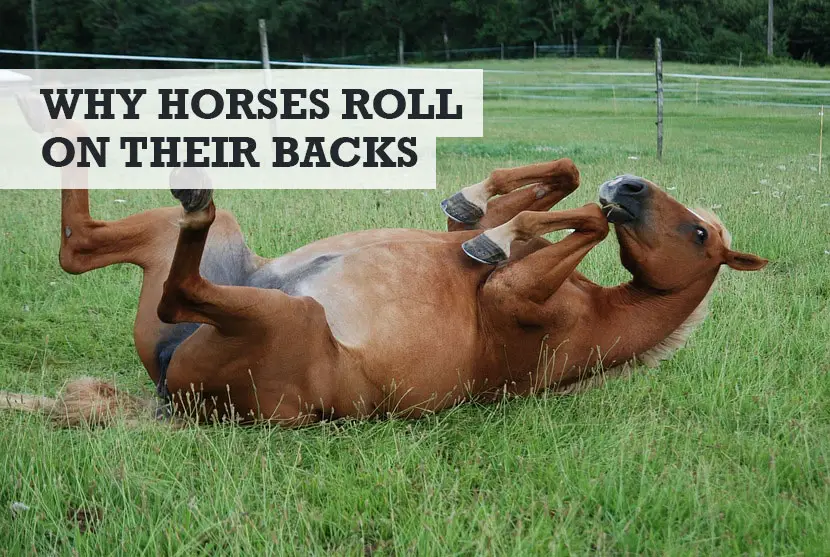For centuries, man and horse have co-existed together. Horses have played an important part of our evolution when you consider industry and agriculture. But there are still some things they do that remain a mystery, for example, rolling in dirt and mud. If you’ve ever wondered why horses roll in the dirt, here’s the full lowdown.
Why do horses roll? Horses roll in the dirt, ground, mud, and grass for reasons believed to include the shedding of hair, grooming, regulating their body temperature, stress relief, happiness, or simply because it feels good.
As you can see, there’s no one specific answer which is why you need to monitor your own horse. Your horse could be rolling on the ground out of happiness, or out of stress. Read on as I explain more, and how you can figure it our best.
Why do horses roll on the ground?
Despite thousands of years of domestication, we are yet to fully understand everything there is to know about horses. Why horses like to roll in mud does have some simple explanations, but it could even indicate a problem.

Don’t worry though, because rolling on the ground is a perfectly natural and healthy horse behavior in most cases. The final point in this list below is the one I really want you to consider though, as you might want to take steps to make sure your horse stops rolling.
It’s only in rare circumstances that the rolling actions signal a problem with a horse, more on that later though.
1. Horses roll to groom themselves
Horses are inherently clean animals and will roll on the ground and dirt to get rid of any excess hair. The horses roll on dry and dusty grounds to remove dead hairs, dried sweat, and even flaky dead skin.
2. Horses roll to get rid of an itch
It’s also believed that horses roll around in the dirt to get insects and ticks off them. Some trainers also think that by rolling in mud, horses are adding a layer of dirt to their coat to repel and discourage insect bites.
The best-groomed horses will naturally attract the most attractive mates, and that’s why they probably persist in rolling in mud and dirt… which might sound counterintuitive to us.
3. Horses roll to protect themselves against the sun’s UV rays
There’s also a theory that horses have evolved to rolling on the ground as the thin layer of dirt and dust will act as a natural sunscreen.
4. Horses roll to show dominance
Horses can be territorial creatures. When they are in a herd together, they have been observed to roll on the ground to assert their dominance.

By rolling on the ground, a horse can leave its unique scent for the other horses. A horse’s scent reveals a lot of information about the animal. The released pheromones reveal the rolling animal’s age, gender, and current mood state.
5. Horses roll to communicate with other horses
Horses communicate with each other in many ways, but one could be by rolling on their backs. The dominant horse will usually have a favorite spot for its rolling activities. There’s an unwritten rule in the horse spot regarding rolling spots.
Handy Hint: Before a horse rolls they will often paw at the ground first to check it’s suitable to drop onto.
6. Horses roll to control their body temperature
It is not unusual to find horses rolling on the ground to bring their temperature up or down. Horses are known to roll on their backs when it’s hot, and when it’s cold. Depending on what they’re rolling on, will depend on the result – e.g., cooler earth, wet grass, or snow.
7. Horses roll for the chiropractic benefits and relaxing
Rolling in the dirt helps can help to relieve aches and pains or might help your horse’s spine. Owing to the intense nature of their work and play, horses are vulnerable to vertebral subluxations. This act could correct any issues.
Horses are very muscular animals and their physical attributes have played a pivotal role in shaping their fruitful alliances with us humans. Horses might be rolling in mud and dirt to helps to loosen up their muscles.
8. Horse roll as an indicator of their mental state (happy or stressed)
When you see your horse rolling on the ground and grass, it might not always be due to another of the previous points but could point towards how they are feeling. And this is where it can be tricky to diagnose.
Horses are individuals and will do different things to self-soothe. Observe your own specific horse; some horses they only roll when happy, but for others it could mean they are stressed and frustrated and rolling makes them feel better by relieve their worries.

Many horses will love to roll in dirt when they’re excited and happy. This act probably simply feels good. A happy horse tends to be extra playful, and you’ll notice them bouncing around and ground rolling on their backs to express joy.
You honestly won’t know why your horse is rolling in dirt if it’s a mental trigger until you spend some time watching the habit, and the hours leading up to and after it.
Handy Hint: Here are 14 signs that show whether your horse has bonded with you or not.
Should I let my horse roll and when to worry?
You should let your horse roll on their back. It’s perfectly natural and normal behavior for them and is part of their nature developed through the evolutionary process.
However, as I touched on above, there are times when you might want to worry about your horse rolling.
In most cases, rolling on the ground is perfectly healthy and natural for horses. I’ve even heard of some stubborn horses who don’t want to work and will roll on their backs to try and get out of it!
On very rare occasions, however, this behavior might indicate an underlying problem with the animal. For example, the horse could be trying to relieve stress.
If your horse wants to roll when riding it, the animal is probably uncomfortable and in pain. There could be some insects bothering the animal or something pinching and poking them, or even a more serious health condition.
If your horse seems to have a constant itch and is rolling more than usual, there could be an issue. There might be insects bothering it, or the horse might be stressed.
I also read an account where a trainer said their horse was rolling in the ground due to colic.
A horse that’s genuinely happy rolls in circles repeatedly. It then gets to its feet, shakes off the dust and the routine continues. A horse suffering from colic torsion will often drop to the ground without a moment’s notice.
These sick creatures can begin rolling anywhere. In the fields or when locked up in their stalls. They’ll’ then roll violently before getting back up.
Colic is a term used to describe a symptom of abdominal (belly) pain, which in horses is usually caused by problems in the gastrointestinal tract. There are over 70 different types of intestinal problems that cause colic symptoms, which range from mild to severe (life-threatening) in nature.
Liverpool University Equine Hospital, https://www.liverpool.ac.uk/equine/common-conditions/colic/what-is-colic/
Horses rolling on the dirt because of colic probably won’t shake off the dust afterward. They might also appear sweaty. If that behavior describes your horse, please call a vet right away and have the animal looked at.
Why do horses roll after a bath?
I’ve observed that horses will often want to roll in dirt straight after a bath as they are still wet. They probably want to feel that lovely dust and mud on themselves again to help with some of the points raised above.
You can probably relate to this scenario: You have spent hours washing and brushing your four-legged companion. Once you’re satisfied with an excellent job, you turn away for a second. The next thing you know, the horse is innocently rolling in the nearest mud puddle without a care in the world.
The horse trainer in the video below backs up my thoughts and agrees.
Why do horses paw the ground before they roll?
Horses will paw the ground when they are frustrated, bored, or want attention. If you are seeing this behavior before a roll on the ground, it could point towards you horse being stressed and worried.
Alternatively, it could be entirely innocent.
Horses could be pawing the ground before they roll to identify the perfect rolling spot. Digging in their paws on the ground enables them to spot the softest areas. This practice also allows them to loosen up the dirt a bit.
How do you stop a horse from rolling in dirt?
I honestly don’t think you can stop horses rolling on the ground so good luck with that! Rolling is mostly instinctive for these animals. There’s little you can do to stop them from going about this natural practice.
How contagious is horse rolling?
Rolling for horses is exactly like yawning for us humans. When the first horse flips over and begins acting strangely, the others quickly follow suit.
It’s very common to witness horses lined up in a field, all just rolling and having the time of their lives. Instead of viewing these rolling tendencies as a contagious after-effect, experts think it is a way to bond with the herd members.
Do horses roll when they are happy?
I wanted this to be the last word on the matter, I appreciate I could possibly worried some readers about their horse rolling on the grass. The bottom line is, most horses will be happy when they are rolling.
It’s only in rare cases when rolling on the ground and dirt should be viewed as a problem – observe your horse for any signs of stress.
Conclusion
Since the dawn of time, man and horse have co-existed together. Our evolutionary story is incomplete without mentioning the immense contribution of horses. The story of horses and humans dates back some 6,000 years ago.
They can still be very mysterious to use though; and the rolling on their backs in dirt is one such habit which you can never be 100% sure on why they are doing at the time.
But in the main, it should be seen as a happy event.
It’s always funny to that after that frenetic activity and rolling on the mud, the horse resets to its default settings and goes about grazing as if nothing ever happened.
You might also like…
- Do horses mate with donkeys in the wild?
- Tips for introducing horses and donkeys together
- The real reason why a police horse will wear a visor
Image in header via https://pixabay.com/photos/horse-nature-free-animal-equine-2031126/

